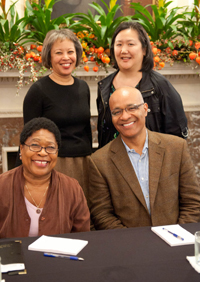Milbank Tweed Forum panelists consider "post-racial" America (VIDEO)
The panelists at the November 16 Milbank Tweed Forum, moderated by Professor Kim Taylor-Thompson, tackled the thorny question of whether the United States had entered a “post-racial” era.
Taylor-Thompson recalled the euphoria surrounding Barack Obama’s 2008 electoral victory. Despite unmistakable progress in race relations, she said, serious problems remain, including disproportionate incarceration of African American and Latino males, an educational achievement gap between white and minority students, and highly racialized poverty. The worry, she said, is that a doctrine of post-racialism could silence further conversation about race and racial disparities.
 The panelists discussed the fact that “post-racialism” means different things to different people. Professor Sumi Cho of DePaul University College of Law defined it as “a 21st-century ideology that refers to symbolic progress to suggest that the state no longer needs to adopt racial remedies, and civil society no longer needs race as a central organizing principle.... The depiction of the U.S. as a post-racial society should be understood to be a particular kind of racial project that seeks to silence, defame, and appropriate blackness. Such a project is necessary to redeem whiteness morally to recover its pre-Jim Crow value in a post-civil rights, post-racial era.”
The panelists discussed the fact that “post-racialism” means different things to different people. Professor Sumi Cho of DePaul University College of Law defined it as “a 21st-century ideology that refers to symbolic progress to suggest that the state no longer needs to adopt racial remedies, and civil society no longer needs race as a central organizing principle.... The depiction of the U.S. as a post-racial society should be understood to be a particular kind of racial project that seeks to silence, defame, and appropriate blackness. Such a project is necessary to redeem whiteness morally to recover its pre-Jim Crow value in a post-civil rights, post-racial era.”
Professor Paulette Caldwell proposed that “post-racialism invites us to reconcile the tension between our sense of ourselves as a nation built on racial equality and enormous race-based disparities that continue and that are deepening. It defines racism only in terms of invidious intent, and then it tells us that racial minorities are no longer subject to systemic discrimination.... Since minorities are no longer subject to that discrimination, post-racialism rejects race-conscious remedies as a grant of benefits to minorities at the cost of whites, and those remedies themselves create racial inequality. Finally, since racial minorities are no longer subject to invidious discrimination, any remaining disadvantages they experience are their own fault, reflect their own inadequacies and own problems.”
“Are we post-racial?” asked Ralph Richard Banks, Jackson Eli Reynolds Professor of Law at Stanford Law School. “Well, it depends.... We have disavowed what had been for many generations the official ideology of the United States, which was one of racism.... We have rejected that official ideology, but then in another sense of course we’re not post-racial, if by post-racial you mean that race is no longer a factor in American society and it’s no longer culturally significant. Quite the opposite.... In all domains of life, we almost can’t understand what’s happening in those areas without thinking about race, so pervasive is race in our society. We’re not post-racial in that sense. So the bind that we’re in is that people genuinely do want to be color-blind, they want not to see race, but the tragedy is we can’t realize that aspiration because race remains so pervasively significant.”
Watch the full video of the event (1 hr, 15 min):

